

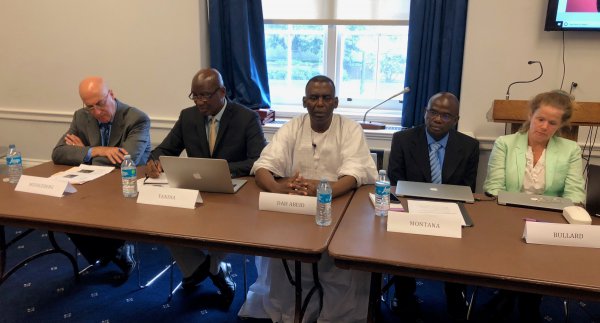
Ismael Montana, Vice President of the WARA board, recently gave a presentation at the US Congress focusing on the abolition of slavery and its effects in Ottoman Tunisia. The presentation was part of a larger event organized by UNPO focusing on the eradication of slavery in the Sahel region.
We are proud to have WARA represented at such an event!
You can read more about it here.
An Associate Professor of Art History at the University of North Carolina Chapel Hill, Dr Victoria Rovine conducted this presentation at the West African Research Center on Wednesday, June 7, 2017. The session was moderated by a young Senegalese filmmaker and design specialist, Mrs Fatou Kande Senghor. Fatou Kande has been working on style and design and integrates various components in her films. As it turns out, Kande’s teachings are based on the many articles and books written by Professor Rovine that she has read over the years. The two women discovered this hidden and unknown connection while sitting and discussing during and after the presentation.
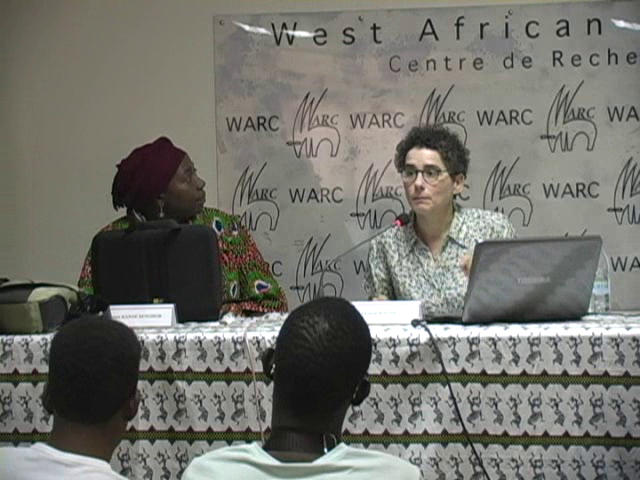
left to right: Fatou Kandé Senghor and Dr Rovine
Dr Rovine’s presentation and research publications generated a high level of interest among attendees because of the importance of dress in Senegal and West Africa as a whole. It is a particularly intriguing topic because of the colonial origins of a number of materials (wax, fancy) regularly worn by Senegalese and other West African women and so expertly acclimated to the point of passing as local production.
The presentation was followed by lively and insightful conversations between the UNC Chapel Hill faculty member and the audience.
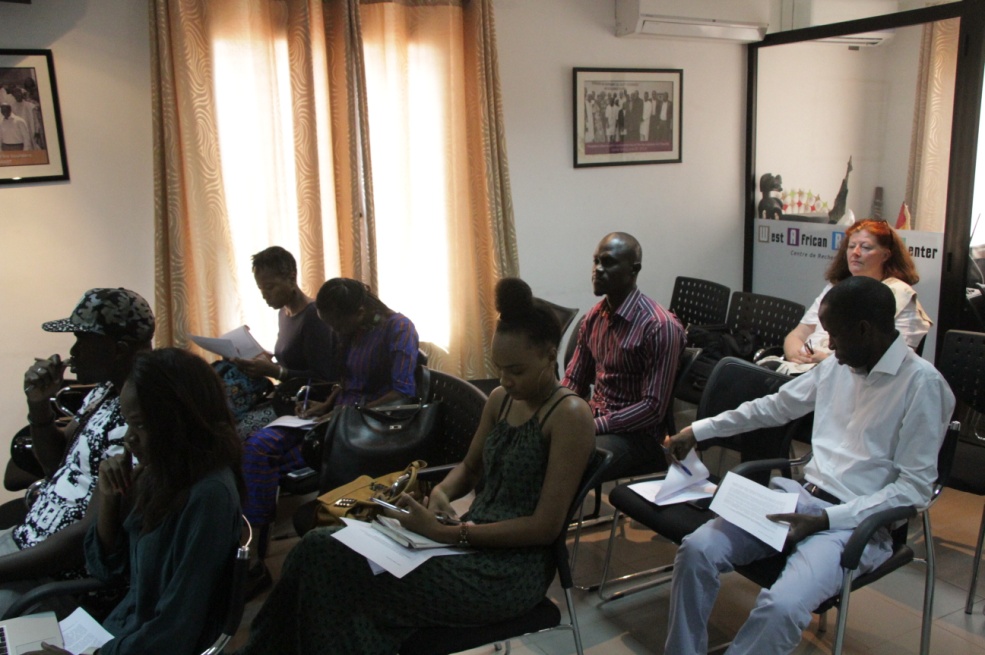
A partial view of the audience
A sequel to the pioneering study on Gender and the Judiciary in Africa: From Obscurity to Parity?, this book examines the issue of gender diversity, representative benches and international courts by focusing on women from the continent of Africa who have served in international courts. This study challenges existing discourse on gender diversity in international courts by arguing the need to disaggregate gender diversity with a view to understanding intra-group differences, strengths, challenges and contributions. While feminist legal scholars have interrogated the questions of gender diversity on international courts, no study has focused exclusively on who the women judges are, how they get to the courts and what happens when they get there. This book provides the first detailed account of women on international courts with a focus on African women. It provides a fresh and focal examination on the question of gender diversity by detailing the experiences of nine women judges. Situated within different theoretical frameworks, but drawing largely from postcolonial feminism, feminist institutionalism, feminist legal theory and legal narratives, this book brings together established scholars, creating a multidisciplinary platform for investigating questions on judicial appointments, gender, geographic location, class and professional capital, among others, combine to shape the lives of the African women who sit on international courts. Using primary data collected through personal interviews, each chapter provides glimpses into the lives and professional trajectory of each judge, providing a rich and theoretically grounded narrative which, would otherwise not be heard in mainstream feminist legal scholarship. The book makes an important contribution to feminist legal scholarship by using legal narratives as a tool to unveil the silences on the lives of women from Africa who have made great gains in accessing international benches. Furthermore, this book is positioned as a leading exposition on the need for documenting the contributions women from Africa are making to both domestic and international courts. The book makes critical contributions to African feminism, feminist legal scholarship, international law, gender studies and gender and judging. In essence, this book opens the door for future research on African women at the nexus of gender, courts, judging and international law and organizations. This book will be of interest to a wide variety of audiences including governments, policy makers, civil society organizations and for courses on women and genders studies, women and politics and feminist activists interested in all questions on gender and judging. The foreword is provided by Hon. Judge Gabrielle Kirk McDonald, former judge and president of the International Criminal Tribunal for the former Yugoslavia (ICTY) and former arbitrator, Iran-US Claims Tribunal (IUSCT).
WARA is pleased to announce this accomplishment from our Vice President Dr Ismail Rashid! Check out his book Understanding West Africa’s Ebola Epidemic: Towards a Political Economy. This work is the first book-length study of the recent outbreak to explore the wider social, economic and political context, edited by Ibrahim Abdullah and Ismail Rashid. It is a comprehensive critique of socioeconomic issues revealed by the world’s deadliest outbreak of Ebola virus. Check it out at http://bit.ly/zedbooks along with other books from @Zedbooks such as Burkina Faso A History of Power, Protest and Revolution by Ernest Harsch http://bit.ly/zedbooks2
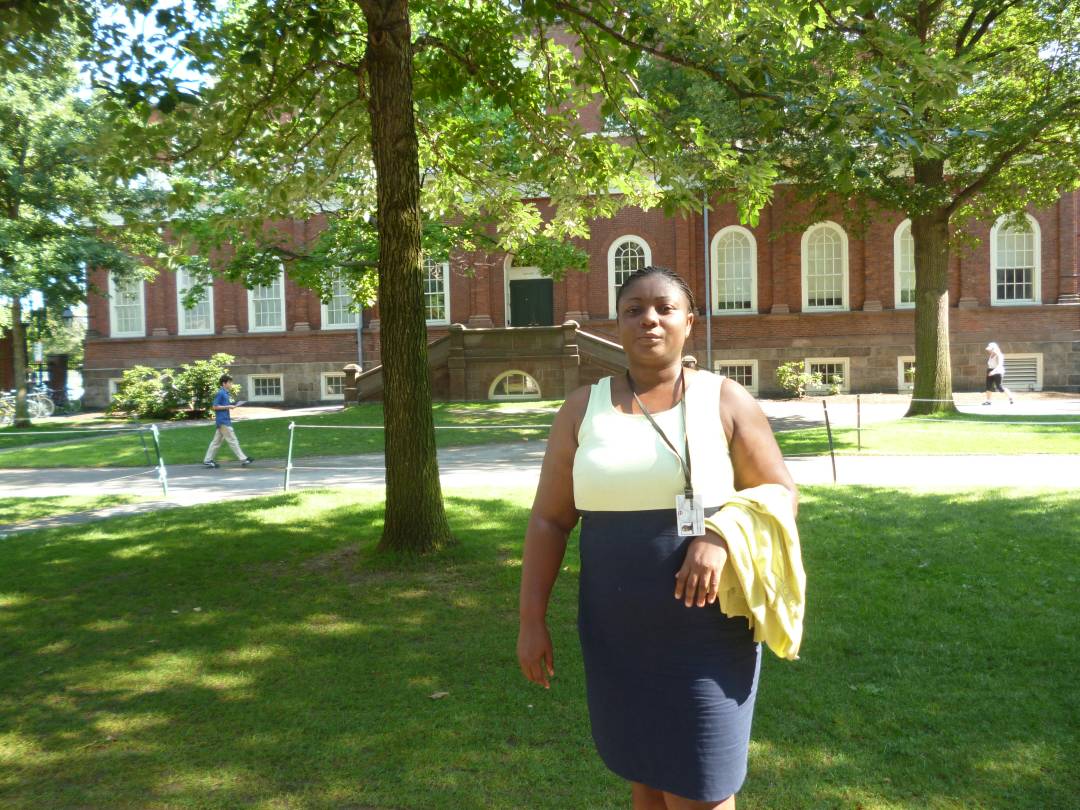
(Ms. Adjoh-Davoh at Harvard University)
My name is Valerie Delali Adjoh-Davoh. I am a Doctoral candidate at the Department of History, University of Cape Coast. The title of my research is “Pawnship in the Gold Coast Colony: Pawn Child Labour in the Period of the Cash Crop Revolution 1874-1940”. The thrust of the research is that market forces after abolition of domestic slavery in 1874 coupled with the introduction of cocoa in the 1890s intensified the use of pawn children in production and export of cocoa until the establishment of Ghana’s Cocoa Marketing Board in 1938. In addition, the work gives understanding to the present use of children in cocoa production in order to curtail it due to the International Labour Organisation’s laws to eliminate the worst forms of child labour in developing countries by 2016.
My fellowship abroad was to conduct research at Harvard University libraries which included: the Houghton library and the Harry Elkins Widener Memorial Library. Also, the fellowship was intended to collaborate with Professor Emmanuel Akyeampong and other scholars interested in forms of unfree labour which included pawnship.
I arrived in Boston on July 2, 2017 where I was warmly received by the fellows and events officer, Rosaline Salifu, of the Harvard Center for African Studies. Since I arrived on a Sunday and July 4, 2017 was a public holiday I had to settle in and formally report to Harvard Center for African Studies on July 5, 2017. I met with my faculty sponsor, Professor Emmanuel Akyeampong, on July 6, 2017. We discussed issues regarding publication of my work when completed, introduction of researchers or scholars in the area of unfree labour, requirements for international publication of both books and articles, and my use of the Harvard University libraries. Also, Professor Akyeampong made useful contributions to my work since he is an expert on forms of unfree labour.
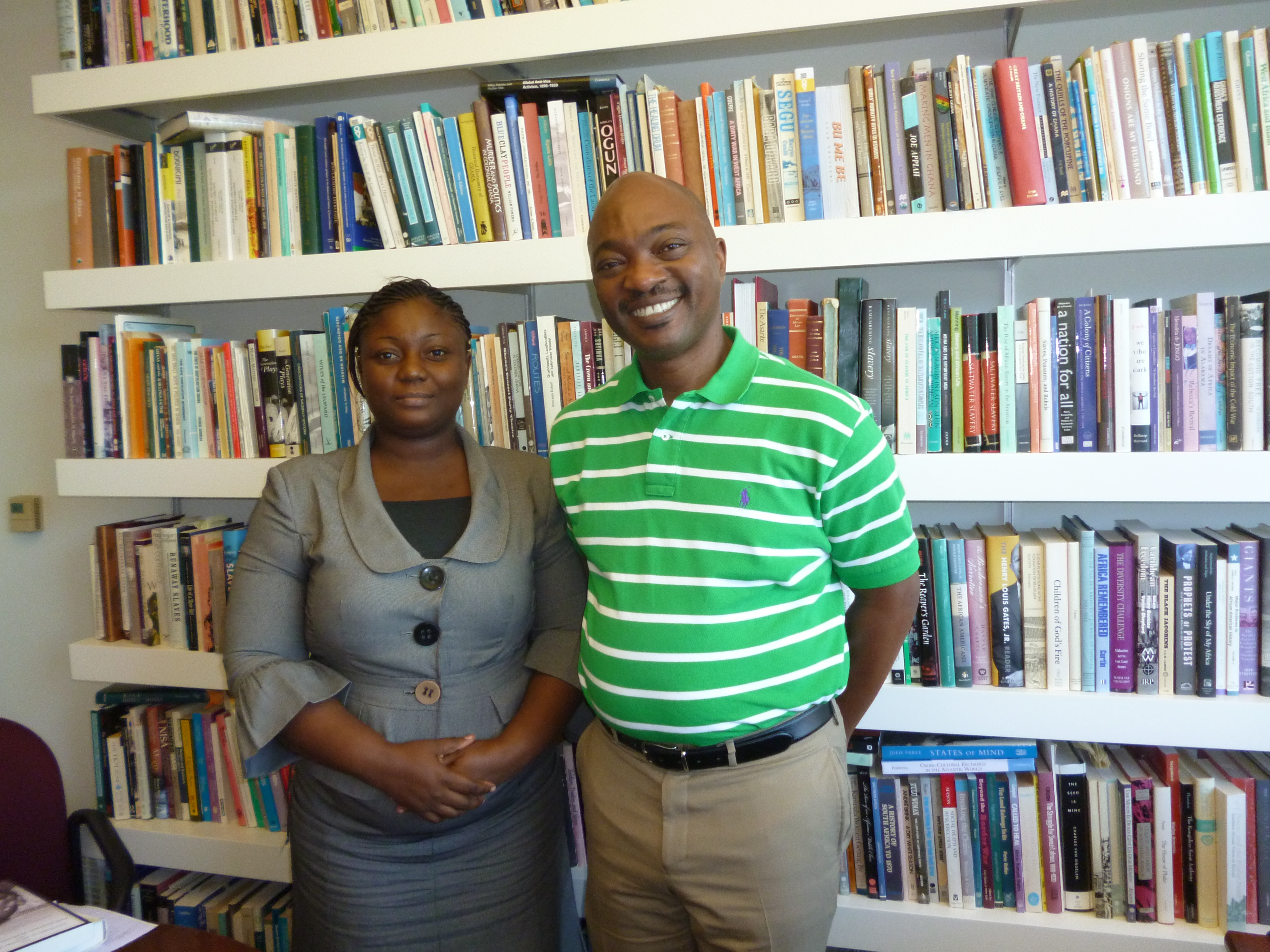
(Ms. Adjoh-Davoh met Prof. Akyeampong on July 6th, 2017)
Through the fellowship I was able to obtain over fifty books and articles from the use of the Harvard University libraries. These included literature on anti-slavery movement, abolition and the end of slavery, pawning among the Fante of the Gold Coast, and child labour. Harvard University also has a franchise which allows its researchers to access dissertations world Wide via ProQuest dissertation in my area of study which hitherto were unavailable to me. These materials will go a long way to enrich my dissertation, later research and teaching generally.
The Harvard University online Archive was useful in gathering pictorial representations of some events in the Gold Coast. These pictures reflected events such as the 1874 Anglo-Asante War, colonialism, Market setting in Cape Coast in the colonial period, female fashion, and Fetishism during wars.
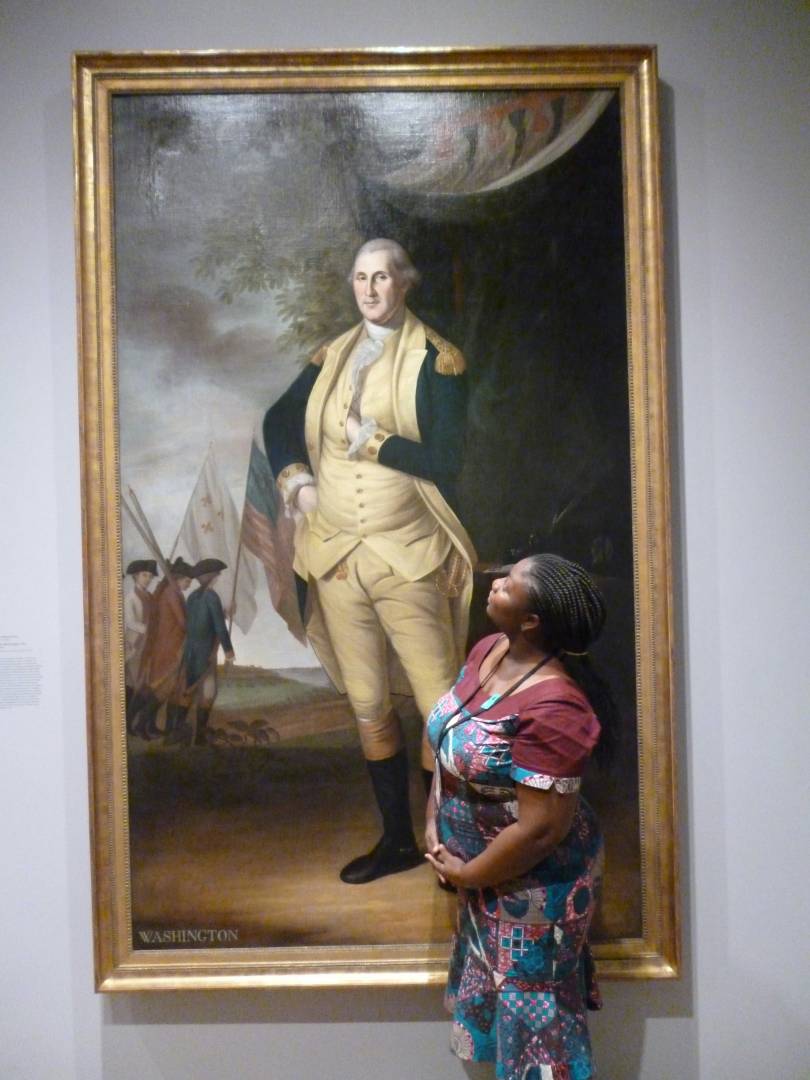
(Ms. Adjoh-Davoh at Harvard Art Museums)
I benefited from my visit to the Harvard Art Museum. At the Harvard Art Museum I had the opportunity of being taken through various artifacts on Africa, the Muslim world, Christianity and other world religions. I was provided with firsthand information on most of the cultures which gives a better understanding to the theoretical aspects of what I knew about other world religions.
Also, I had access to primary materials from the African Studies library within the Mugar Memorial Library, Boston University particularly on Ghana which is useful for my present research as well as later research and study. The primary materials ranged from topics on Ghana’s Cocoa Marketing Board and cocoa in general, Cocoa hold up in the Gold Coast, cocoa co-operatives, child rights in Ghana, agriculture in Ghana, land tenure and Gold Coast annual reports from 1918 to 1954. Besides, these primary materials could be used for many other researches on Ghana.
As a result of the fellowship, I was introduced to a number of scholars in my field of research by Professor Emmanuel Akyeampong. These scholars are Professor Sandra Elaine Greene who is an expert on Ghana, Professor Gareth Austin who has researched extensively on Ghana and forms of unfree labour, and Professor Trevor Getz who has researched extensively on unfree labour after abolition in the Gold Coast. These professors provided useful suggestions to my research which I believe will go a long way to enrich my dissertation and later research.
Further, I was introduced to new primary research sources by my Faculty sponsor such as the Basel Mission Archives online that he compiled in the past to supplement the primary sources which were already available to me on pawnship. The Basel Archives online are especially useful since there are limited sources on pawnship and other forms of unfree labour in the Gold Coast in particular.
In addition, I received a compiled course pack as a gift from my research which to me was his demonstration of his commitment to see others excel and a mark of a good mentor which everyone would want to have in the early stages of their career.
On July 11, 2017 I visited the West African Research Association’s office at Boston University. I met Professor Jennifer Yanco (the immediate past Director of WARA) and Caroline Johnson (the Operations Manager of the West African Research Association). An interview was then conducted on my research and we deliberated generally on child labour. The interview conducted has given me some exposure and recognition regarding my research which I believe will open other opportunities in the future.
Thank you very much to Professor Emmanuel Akyeampong (Oppenheimer Chair of the Harvard Center for African Studies) for inviting me. I greatly appreciate his mentorship and suggestions to see my work progress. Also, I greatly appreciate the support of the staff of the Harvard Center for African Studies in their professionalism in handling my Harvard Id issues and having a fruitful research visit.
Finally, I am very grateful to the West African Research Association for the fellowship to conduct research at Harvard and Boston University libraries as well as collaborate with experts in my field of research. I believe the fellowship is a stepping stone to greater heights in my career as a lecturer and researcher. Therefore I am eternally grateful for the opportunity.
The West African Research Center (WARC), on Tuesday, June 6, 2017, convened and hosted a press conference to advertise a major event scheduled to kick off on Friday, June 9 to celebrate the achievements of the Father of African Cinema, Sembene Ousmane.
The press conference featured Professor Samba Gadjigo (Mount Holyoke College, Mass. USA) author of several books and articles on Sembene and of the celebrated documentary titled Sembene!, sitting next to well-known Senegalese filmmakers Ben Diogaye Beye and Mansour Sora Wade.
Reporters were informed that for three days running (Friday, Saturday, Sunday, June 9, 10, 11) the documentary Sembene! will be shown in up to 35 African countries. In Senegal, the same documentary will be shown along with well-known films by Sembene such as Gelwaar, Emitai, Mandat-Bi, La Noire de….in various locations including the capital Dakar, Pikine, Guediawaye, Saint Louis, Thies, Tambacounda, Toubacouta, Sokone etc…..
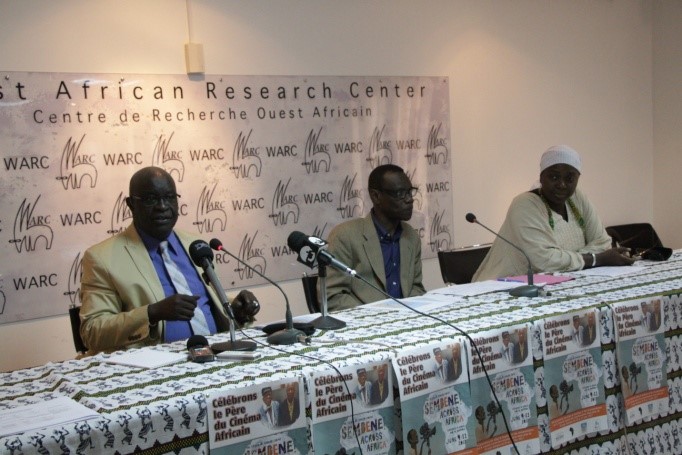
Left to right: Prof Sene, WARC Director; Prof Samba Gadjigo, Mount Holyoke College & Galle Ceddo; Mme Fatou Kande Senghor, activist and filmmaker
Events in Senegal are jointly organized by the West African Research Center (WARC), Galle Ceddo (established in the USA), Cacsen and Dararay Sembene(Senegal)
World-renowned chef Pierre Thiam joined the West African Research Center and the Dakar Women’s Group on Wednesday, June 7th, to discuss Senegalese and West African cuisine, linking it to the importance of local produce, cereals, vegetables, and fruit.
Chef Thiam, who is known around the world as the ambassador of West African cuisine, headed up the 2017 Tastes of West Africa Culinary Institute that took place in Senegal in February. His restaurant, Nok at Alara, in Lagos continues to receive rave reviews.
In Dakar on Wednesday, Chef Thiam presented as Q&A with faculty from the City College of New York and Barbarao Syrrakos of the Dakar Women’s Group. During this session, Chef Thiam shed light on the background of his leaving Senegal in the mid-80s to go and try his luck in US higher education. While working as a waiter, his fascination for cooking was born and from that point forward followed his calling to become a chef.
Chef Thiam also discussed Senegalese cuisine and the need to preserve traditional recipes, especially since they are particularly healthy. He insisted on the re-introduction and importance of local produce for both their nutritional quality and richness as an effort to keep the people healthy.
Chef Thiam is famous for his appearance on Anthony Bourdain’s Parts Unknown, CNN’s Inside Africa, and Food Network’s Iron Chef. His two books showcasing West African-influenced cuisine are: Yolele! Recipes from the Heart of Senegal and more recently SENEGAL: Modern Senegalese Recipes from the Source to the Bowl.
Every year (for the past three years), during the month of Ramadan, the celebrated Senegalese music star Youssou Ndour and his media group GFM hold, for over ten days, a festival of sacred music in Senegal with the participation of music groups hailing from Senegal, Morocco, Mauritania and several other Muslim countries.
For the 2017 edition, the initiator had earlier expressed the desire to give the event a more established academic component. In this respect, University Cheikh Anta Diop, the University of North Carolina Chapel Hill and the West African Research Center (WARC) were approached. That is why this year’s Salam Festival kicked off with a three-day symposium on Sufi Zikr performance.
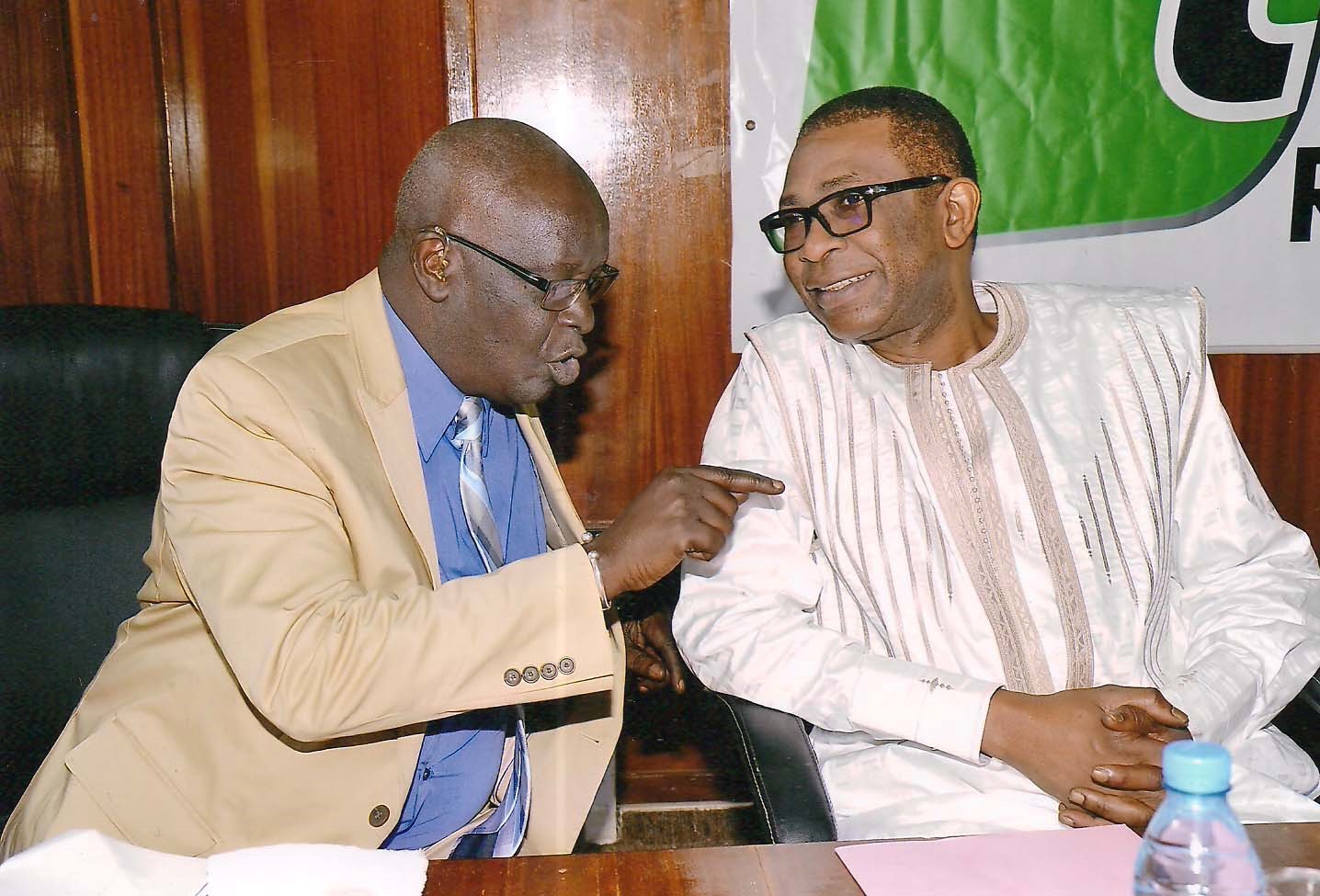
WARC Director, Professor Ousmane Sene, and world-renowed Senegalese singer, Youssou Ndour, having a captivating discussion at the Salam Festival symposium
Since Monday, June 5 in the main amphitheater of University Cheikh Anta Diop campus, 15 participants from Turkey and 12 from the United States (mainly from UNC Chapel Hill) have been exchanging ideas on various themes such as Sufi Figures, Forces and Localities, Sufi Geneses and Genealogies, Sufi Voices etc….. Meanwhile and for over ten days, every evening the Senegalese capital Grand Theatre, Daniel Sorano National Theatre in Dakar and many other meeting squares in the capital and other parts of the country will be enlivened with the rapturous chants and songs from Senegalese, Turkish, Moroccan, Mauritanian religious singers.
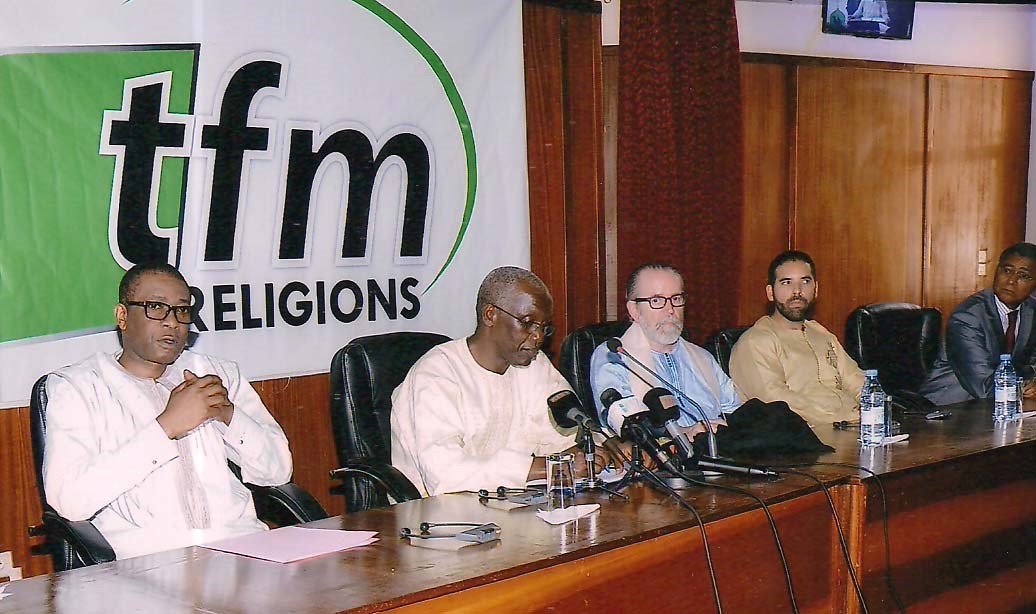
Left to right: Mr Youssou Ndour; Prof Ibrahima Thioub, Rector, UCAD; University of North Carolina delegates: Prof Carl Earnst and Michael A. Figueroa; Moroccan Ambassador to Senegal
At the West African Research Center in Dakar, Senegal, WARA Post-Doc Grantee Emily Riley, of Michigan State University, hosted a discussion on June 1, 2017 to coincide with her research project, “Teranga and Hospitality as the Foundation of the Senegalese Nation and of Political and Religious Practices in Dakar.” This event was held as part of the WARC Researchers’ Mini-Seminar series.
Dr. Riley has been visiting Dakar as a WARC affiliate over the past four years to research a subject that is a very important feature of Senegalese social life and values: Teranga.
The Wolof word “teranga” is a noun derived from the verb “teral” meaning to treat a guest decently – royally most of the time – and the Senegalese people actually pride themselves with the consummate art of making visitors feel completely at home.
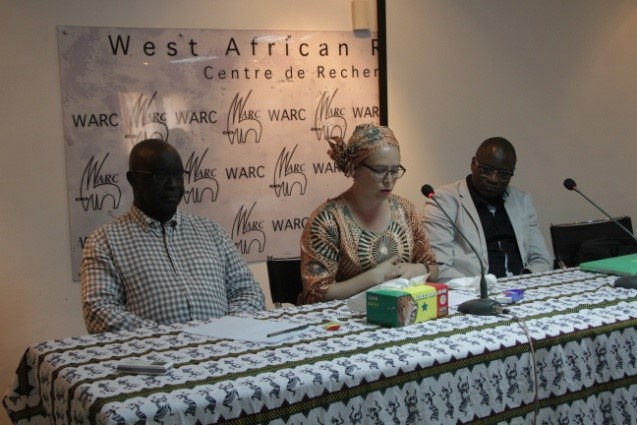
Left to right: Pr Ousmane Sène, WARC Director, Emily Riley, MSU & Mamarame Seck, IFAN
The treat however has a cost, in some case a very high one at that, which may cause Senegalese families to overspend, incur debts, and fall into a state of economic hardship. This means that the practice of teranga could potentially be economically counter-productive as it depletes savings which, otherwise, could be invested. Instead, it goes toward the contentment of neighbors, relatives, friends, and sycophants.
Dr. Riley, who has become extensively familiar with Senegalese culture, expertly introduced the subject at this mini-seminar and engaged the audience in a lively Q&A session that brought up some very deep insights.
This event brought in some 30 participants, including visiting researchers and scholars, local academics, grad students, and Dr. Riley’s many Senegalese friends.
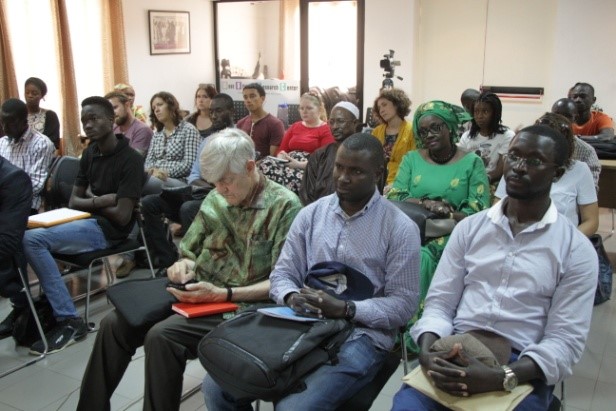
Seminar participants ready to talk “Teranga”